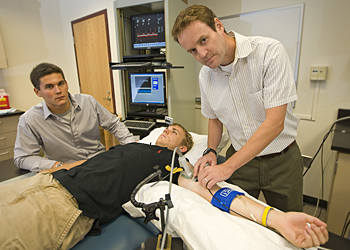
David G. Edwards, assistant professor of health, nutrition and exercise sciences, received a $415,264 grant from the National Institute of Diabetes and Digestive and Kidney Diseases (NIDDK) last year. That was followed by a second NIDDK grant for $216,250 announced recently.
“We are studying chronic kidney disease because these patients are at very high risk for cardiovascular disease, even more so than would be predicted from traditional risk factors,” Edwards said, adding, “Research has shown that they are more likely to die from cardiovascular disease than reach end stage renal disease. Our primary focus is trying to figure out why that is and what therapies might help.”
NIDDK describes chronic kidney disease as the loss of function as a result of which the kidneys fail to remove wastes and extra water from the blood as they should.
Chronic kidney disease can result in other health problems, including anemia and bone problems, with heart disease the major cause of death for all people with chronic kidney disease, according to the National Kidney Foundation.
NIDDK said experts estimate that 20 million Americans have significantly reduced kidney function, and even a small loss of kidney function can double a person's risk of developing cardiovascular disease.
Edwards said the initial grant is funding an investigation into the mechanisms of endothelial, or vascular, dysfunction in patients with chronic kidney disease. The endothelium is the thin layer of cells that line the interior surface of blood vessels.
“Endothelial dysfunction is recognized as a key process in the development and progression of chronic kidney disease and may be one reason for this increased risk of cardiovascular disease, so understanding the mechanisms of dysfunction is potentially very important,” Edwards said. The study is being performed using ultrasound of the brachial artery and, as such, focuses on larger blood vessels.
An understanding of the mechanisms responsible for endothelial dysfunction in chronic kidney disease is important for improving renal and cardiovascular outcomes, Edwards said.
He said oxidative stress has been shown to be elevated in patients with chronic kidney disease and those on hemodialysis, and it has the potential to impair endothelial function. Thus, endothelial dysfunction secondary to oxidative stress may be a mechanism by which renal function deteriorates and the risk of cardiovascular disease increases among patients with chronic kidney disease.
Investigations into the mechanisms of endothelial dysfunction have the potential to lead to the development of therapeutic measures aimed at maintaining renal function and reducing cardiovascular risk in chronic kidney disease, Edwards said.
The focus of the work funded by the first grant is to elucidate whether oxidative stress plays a role in endothelial dysfunction in patients with moderate to severe chronic kidney disease before they require dialysis. The initial goal is to investigate whether oxidative stress plays a role in impairing endothelial function early in the progression of chronic kidney disease by using an acute infusion of ascorbic acid.A second goal of the project is to identify biological markers that predict an individual patient's endothelial response to ascorbic acid infusion in order to identify patients who may require more aggressive intervention to reduce oxidative stress.
These studies are innovative in that the ascorbic acid infusion protocol will generate new information regarding the role of oxidative stress in impairing endothelial function in chronic kidney disease, Edwards said.
The new grant is funding a study of microvascular function in chronic kidney disease. It, too, is investigating the mechanisms of endothelial dysfunction but focuses on the microvasculature, or small blood vessels, by studying the skin blood flow in patients.
The dual grants “will enable us to look at larger blood vessels and smaller blood vessels, providing us a more complete picture,” Edwards said.
Collaborators on the studies include Dr. Michael E. Stillabower, director of cardiovascular research at Christiana Care Health Services, and Dr. Raymond R. Townsend of the University of Pennsylvania School of Medicine.
Edwards said he is hoping to identify patients who might be interested in participating in the studies. For information, contact him at (302) 831-3363 or via e-mail at [dge@udel.edu]. He has laboratory facilities in the Human Performance Laboratory in the Fred Rust Ice Arena.
Edwards joined the UD faculty in 2005 after three years as an assistant professor at the University of New Hampshire. He received a bachelor's degree from UD in 1991, a master's from Wake Forest University in 1993 and his doctorate from the University of Florida in 2002, where he was an American Heart Association Pre-Doctoral Fellow.
Article by Neil Thomas
Photos by Tyler Jacobson


